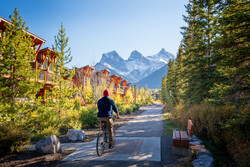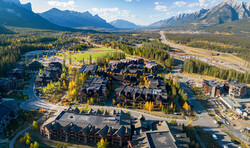
The Context
Canmore is a pretty special place. With big mountain views, a vibrant local economy, and friendly community, this town is a place where people from around the world want to visit for a day or stay for a lifetime.
But like many other mountain towns, Canmore is experiencing a housing crisis. Right now, 25% of homes are not occupied by a permanent resident, despite a 0.9% vacancy rate.
That means that many of the people who stock our shelves, brew our coffee, or teach at our schools cannot access housing and are commuting long-distances or giving up on the Canmore dream altogether.
Canmore would need to see about 2,000 non-market housing units available to address the housing availability and affordability issues contributing to the erosion of our community fabric.

Our Housing Action Plan
We are at a turning point to create a future that meets the needs of our community. Instead of letting outside forces shape our direction, we are taking action to address the housing crisis to create a future Canmore where an average person on a middle-class income can call home, raise a family, and age in place with dignity.
Learn more about the key elements of our plan below:
Implementing the Recommendations of The Livability Task Force
To identify solutions, we launched the Livability Task Force to understand our housing market, the potential futures we faced and, critically, ways to protect our community. We are implementing the three bold steps recommended by the Livability Task Force:
- Limit the growth of tourist homes
- Incentivize full-time/long-term occupancy of homes
- Incentivize purpose-built rentals
The Livability Task Force included the Mayor, two members of Canmore Council, and a representative from Tourism Kananaskis, Spring Creek Developments, a local realtor, a rental property management company, and a Canmore Community Housing board member.
Over the course of a lengthy consultation, this Task Force considered principles of equity, tax incidence, efficiency, red tape reduction, accountability, predictability, and other external considerations that influence the livability in Canmore.
Incentivizing Full-time Occupancy of Homes Through the Livability Tax Program
Starting in 2026, the Livability Tax Program will help fund new affordable housing options, while incentivizing our neighbours to join us full-time.
The Livability Tax Program creates subclasses of property types. We will have a separate tax rate for dwellings that do not house a primary resident—someone who lives or has a renter living in their property for a minimum of 183 days of the year and at least 60 continuous days.
Non-permanent residents will pay rates equal to those who run tourist homes, with 100 per cent of this extra revenue set aside so the Town can help build the 2,000 new non-market homes we need.
- An owner of a residential property, or their authorized agent, will be required to annually declare if their property qualifies for the primary residential subclass by December 31 of each year.
- You can make your primary residence declaration (when open) online.
- To qualify as a primary residence:
- The property must be where the owner or renter conducts their daily life, their government issued identification shows this address, as well as their CRA documents and any other mail they may receive, and
- the owner or renter must live in a dwelling unit on the property for at least 183 cumulative days in a calendar year, and
- 60 of the days must be continuous. This does not mean the owner or renter can't go away for the weekend or on vacation, it means the property is your primary residence you return to. This provision is meant to preclude properties being rented out short-term from qualifying, and
- a person may only have one Primary Residence, and
- the property cannot be in the Tourist Home tax subclass.
- Apartment buildings with all units under one tax roll and employee housing as defined in the bylaw, and individually titled residential parking stalls and storage units will be automatically placed in the primary residential subclass, no declaration will be required.
- There will be a number of exemptions that preclude owners from occupying or renting out their properties in a year. In order to have an exemption recognized, a declaration will still need to be made. The exemptions include:
- the property was sold to an arm's length party in the previous taxation year, is registered or in the process of being registered with Land Titles and is immediately occupied (by the purchaser or a tenant) as a primary residence.
- the property was newly constructed, occupation and normal use of the the property as a primary residence was not possible,
- a dwelling unit on the property was undergoing permitted repairs or renovations that precluded occupancy,
- the owner is deceased in the last two years,
- the owner is hospitalized, or placed in a long term or supportive care facility,
- written order was in force that prohibited occupancy,
- a dwelling unit on the property was impacted by a catastrophic event that precluded occupancy.
The C.D. Howe Institute released a study late last year that found vacant home taxes significantly reduced the number of empty homes while not affecting construction rates at all. In short, this taxation model would increase the supply of homes for those looking to live in our community full-time.
Meeting someone who was born and raised in Canmore—and still lives here— is often called finding a “unicorn.” Well, we’d like to make unicorns a little less rare.
Our decision to introduce this new tax level is focused on providing a fair opportunity for those who want to put down roots and build a life in Canmore while safeguarding the rich, vibrant community fabric that can make this place a hometown for generations to come.
Seventy-five per cent of Canmore households will not be negatively affected by this change, as studies have shown that subclass taxation can unlock new housing, strengthen community bonds, and increase the revenue generated for housing initiatives.
Home vacancy decreases our ability to truly create a sustainable local economy. Not only is it hard to recruit and retain staff with limited housing availability, but fewer residents means less year-round support for local business.
Having more permanent residents means extra revenue for our small businesses, greater access to a larger labour pool, and a more energized community that sticks around after 5 p.m.
Limiting the Growth of Tourist Homes
A Tourist Home is a specific type of property under Canmore’s Land Use Bylaw that needs an official development permit. They can be rented out on a short-term or long-term basis.
While they can be a good source of income and provide a service to meet the needs of our tourist economy, they are designed to provide housing for temporary visitors — pulling potential residential units out of reach for people who want to put down roots in our community.
Incentivizing Purpose-built Rental Accommodation
Not everyone is in a position to (or wants to) purchase a home. That's why having a healthy rental market is an important factor to increase housing choice and affordability.
However, the economics for the private sector to construct rental apartments when land prices are high is extremely challenging, which is why we do not see a lot of it in Canmore.
Purpose-Built Rentals Policy
On Jan. 7, Council approved a purpose-built rentals incentive policy which aims to increase the availability of rental units in our community. The policy will allow a grant equivalent to 75% of municipal property taxes for a period of up to 10 years. In order to qualify, 95% of units must be rented long-term to primary residents of Canmore.
In order for a property to qualify for the incentive, it must meet the following criteria:
- An annual report is required within 30 days after the calendar year end, including supporting documents, confirming 95% of units provided are long-term rental accommodation.
- Grant eligibility starts upon issuance of Occupancy Certificate and signing of the agreement, with proof that 95% of units provide long-term rental accommodation and are rented to primary residents of Canmore.
- Project must result in added floor space to an existing building, a new building, or renovation of existing floor space to provide purpose-built rental housing of three or more units.
- The value of the construction must be $300,000 or more.
Supporting Affordable Housing
One of our most powerful tools as a municipality to address the housing crisis is to encourage the development of "below market" housing, available at a more accessible rate for moderate-income Canmore working households unable to afford to purchase or rent accommodation on the open market.
We use a range of mechanisms to do that on Town-owned land and through density-bonusing incentives to developers.
We are taking action on the housing crisis by exploring potential affordable housing development on the Moustache Lands (in the Palliser area), in alignment with the bold affordable housing vision of the Palliser Area Structure Plan.
Following months of engagement wtih key interest holders, we have wrapped up a feasibility study to explore the future of a potential affordable housing development. The study outlines a proposed design that includes four buildings a mix of commercial retail space and 270 residential rental units. Next steps include council approval on July 8, 2025 to move forward with capital funding applications, with an anticipated groundbreaking in Feburary 2026.
To prepare for this opportunity, council adopted the Revised Land Use Bylaw Amendment 2025-06-Moustache Lands Direct Control District on June 3, 2025. The Direct Control District will enable a mixed-use development that includes between 250 and 350 non-market, affordable residential units, commercial opportunities, and public spaces.
Contact Us
For questions regarding our Housing Action program, reach us at housingaction@canmore.ca
For media inquiries, contact media@canmore.ca
